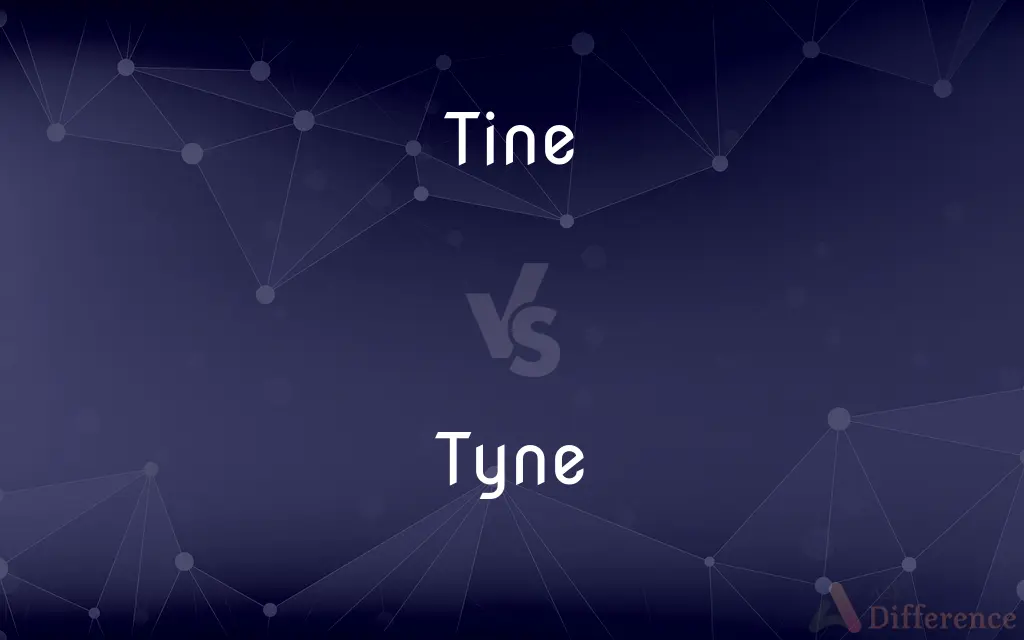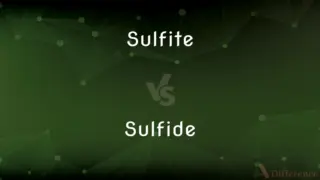Tine vs. Tyne — What's the Difference?
By Tayyaba Rehman — Updated on October 12, 2023
A "tine" is a prong or sharp point, like those on a fork, while "Tyne" refers to a river in England. Though pronounced the same, they have different meanings and uses.

Difference Between Tine and Tyne
Table of Contents
ADVERTISEMENT
Key Differences
The word tine commonly describes a sharp, pointed prong of a tool or utensil. For instance, the prongs on a fork are called tines. In contrast, Tyne doesn't refer to an object or a part of one. Instead, it signifies a river located in England, specifically in the North East.
In the realm of utensils and tools, the term tine has widespread usage. You might hear someone mention the tines of a rake or a fork. On the other hand, Tyne primarily appears in geographical discussions or contexts related to the surrounding region of the Tyne River.
When examining their etymologies, tine has roots in Old English, deriving from the word "tind," which means "sharp point." Tyne, referring to the river, has a different origin, possibly from the Brittonic word "tīna," meaning river, though its exact origins are debated.
While tine can be used in various contexts, from gardening to dining, Tyne is more specific. You might hear about the River Tyne in discussions about English geography, history, or even when talking about the cities of Newcastle upon Tyne or Gateshead.
Pronunciation-wise, tine and Tyne sound identical, leading to potential confusion. However, their distinct meanings and usages make it clear in context. While you can touch a tine, you can sail or walk along the Tyne.
ADVERTISEMENT
Comparison Chart
Definition
A prong or sharp point of a tool
A river in England
Usage Context
Tools, utensils
Geography, history
Etymological Origin
From Old English "tind"
Possibly from Brittonic "tīna"
Common Associations
Fork, rake
Newcastle upon Tyne, Gateshead
Physical Interaction
Can be touched or used
Can be seen, sailed upon
Compare with Definitions
Tine
A prong on a fork or similar implement.
The spaghetti kept slipping between the tines of my fork.
Tyne
A geographical landmark in the UK.
The Tyne Bridge connects Newcastle and Gateshead.
Tine
A spike or point on an object.
The tine on the comb snapped off.
Tyne
A river with historical significance.
Ancient settlements were established along the banks of the Tyne.
Tine
Any sharp, pointed projection.
The tine of the rake got bent after heavy use.
Tyne
A river in northeastern England.
The River Tyne flows through Newcastle.
Tine
A slender pointed part.
I accidentally pricked my finger on the tine of the rose bush.
Tyne
Part of the name of English cities.
Newcastle upon Tyne is a vibrant city in the North East.
Tine
A branch of a deer's antlers.
Tyne
A prong or point of an antler.
Tine
A prong on an implement such as a fork or pitchfork.
Tyne
(obsolete) anxiety; teen
Tine
A spike or point on an implement or tool, especially a prong of a fork or a tooth of a comb.
Tyne
To lose.
Tine
A small branch, especially on an antler or horn.
Tyne
To become lost; to perish.
Tine
(dialect) A wild vetch or tare.
Tyne
To lose.
Tine
(obsolete) Trouble; distress; teen.
Tyne
To become lost; to perish.
Tine
Small, diminutive
Tyne
Anxiety; tine.
Tine
To kindle; to set on fire.
Tyne
A river in northern England that flows east to the North Sea
Tine
(obsolete) To rage; to smart.
Tyne
A waterway in North East England.
Boats frequently sail up and down the Tyne.
Tine
To shut in, or enclose.
Tine
Trouble; distress; teen.
Tine
A tooth, or spike, as of a fork; a prong, as of an antler.
Tine
To kindle; to set on fire.
Coals of contention and hot vengeance tind.
Tine
To kindle; to rage; to smart.
Ne was there slave, ne was there medicineThat mote recure their wounds; so inly they did tine.
Tine
To shut in, or inclose.
Tine
Prong on a fork or pitchfork or antler
Tine
One of the sharp points of a deer's antlers.
The deer had six tines on each antler.
Common Curiosities
Is the River Tyne a major river?
Yes, the River Tyne is a significant river in North East England.
What does tine refer to in context to a fork?
A tine is one of the pointed prongs on a fork.
Which cities does the River Tyne flow through?
The River Tyne notably flows through cities like Newcastle upon Tyne and Gateshead.
Is it possible to have a broken tine on a rake?
Yes, with wear and tear, a tine on a rake or any tool can break or bend.
Can tine refer to something other than a fork's prong?
Absolutely, a tine can also refer to sharp projections on tools like rakes or the points on deer antlers.
Is the Tyne known for any specific landmarks?
Yes, one of the renowned landmarks is the Tyne Bridge connecting Newcastle and Gateshead.
Can you fish in the River Tyne?
Yes, the River Tyne is popular for salmon fishing.
How many tines does a standard dining fork have?
A standard dining fork typically has four tines.
What's the history behind the River Tyne?
The River Tyne has a rich history with ancient settlements, trade, and naval significance.
Can a tine be sharp enough to cause injury?
Yes, if a tine is sharp and pointed, it can potentially cause injury.
Does the word tine have any other meanings?
While tine primarily refers to prongs or pointed parts, in some contexts, it can also mean a slight sound, like a bell's tine.
Is there any wildlife in the River Tyne?
Yes, the River Tyne hosts various fish species, especially salmon, and supports riverbank wildlife.
How do you pronounce tine and Tyne?
Both tine and Tyne are pronounced the same way: /taɪn/.
Is it correct to say "tines of a comb"?
While it's not standard, you can refer to the pointed parts of a comb as tines, but they're typically called "teeth."
Are there any songs or poems about the River Tyne?
Yes, the River Tyne has inspired numerous cultural works, including songs, poems, and stories.
Share Your Discovery

Previous Comparison
Sulfite vs. Sulfide
Next Comparison
Sweet vs. WeetAuthor Spotlight
Written by
Tayyaba RehmanTayyaba Rehman is a distinguished writer, currently serving as a primary contributor to askdifference.com. As a researcher in semantics and etymology, Tayyaba's passion for the complexity of languages and their distinctions has found a perfect home on the platform. Tayyaba delves into the intricacies of language, distinguishing between commonly confused words and phrases, thereby providing clarity for readers worldwide.














































